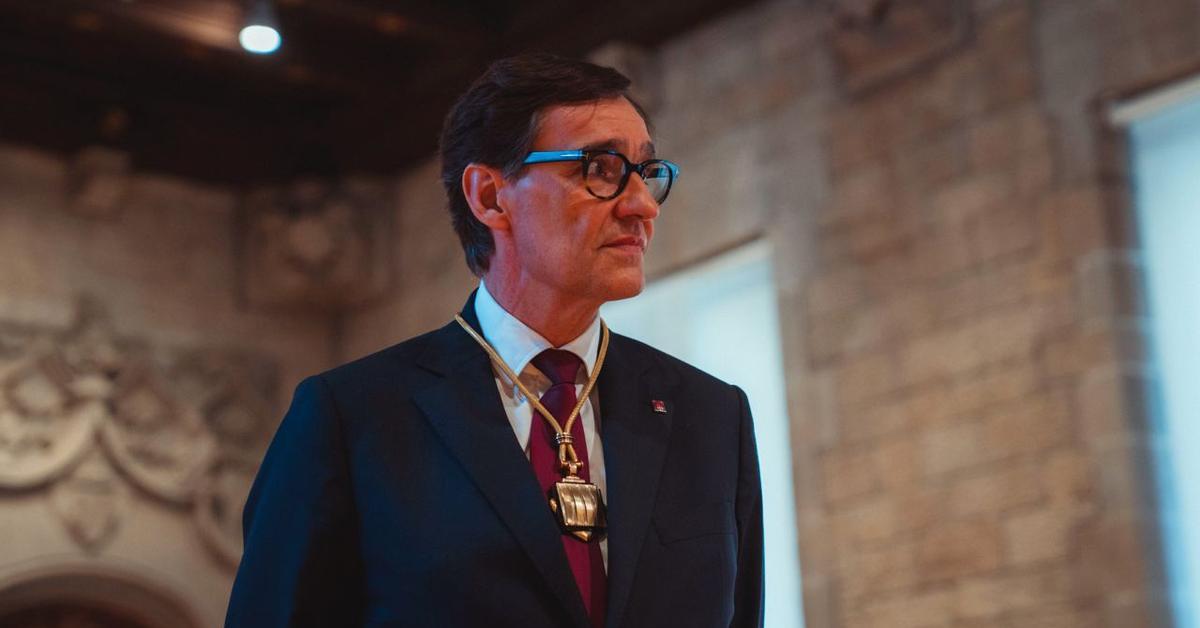
That a president should point out as his first and main challenge that of governing as best he knows how could be obvious, but the discredit of politics has reached such levels (not only in Catalonia) that the simple fact of promising it already becomes remarkable. Salvador Illa, unlike some of his predecessors, does not sell epics and his inauguration as president of the Generalitat has been one more example of the sobriety with which he faces this new stage.
“I take on this responsibility with emotion and emotion, but also with the humility of someone who wants to be, from today, the first public servant of Catalonia. My main objective is to govern as best I can for everyone,” he proclaimed after an oath in which he resorted to the classic formula, which includes loyalty to both the king and the Constitution.
The new president aspires to “unite”, the verb that he uses most often in his speeches, along with “serve”. He intends to heal wounds, something that has been shown to be possible with ERC, and not to further deepen the division between separatists and non-separatists. The socialists insist on sending a conciliatory message, that of not “dismantling anything”, as Illa summarised in Parliament.
The PSC has always boasted of being the party that most resembles Catalan society, due to its transversality and its ability to reach an understanding with other formations. The procés changed everything, including that quality that the socialist leaders boast about, and the legislature that is now beginning will force them to put it into practice. Not only because they want to, but because the PSC has 42 deputies in the Parliament and will have to win support vote by vote to reach the 68 of the absolute majority.
In his brief speech, Illa warned of the demagogic, divisive and populist approaches that endanger coexistence. He did not name anyone, but the process cannot be explained without these overtones, and the most recent example is the latest episode starring Carles Puigdemont, who has reappeared via a video from Waterloo, where he returned on Friday, in which he accuses ERC of “collaborating with the repression.” He argues that he decided not to attend the investiture plenary session because of the risk of being arrested. A danger that was well known since Judge Llarena’s order was still in force and the Mossos had already explained in the previous days that they were going to comply with it because they act as judicial police.
The PSC has avoided entering into the controversy over the actions of the former president and has not joined in the criticism of the operation by the Ministry of the Interior. It has allowed Junts and ERC to tear each other apart and for the Republicans’ mandate to end as it began, with the management of this department called into question. You would have to rub your eyes to believe that Commissioner Eduard Sallent, very well connected to the pro-independence world and who was elevated to head of the Mossos to remove Major Josep Lluís Trapero, was the one who was criticising Puigdemont to the point of comparing him to Jimmy Jump and his trolling on football pitches.
The new head of the Interior Ministry will be the mayor of Santa Coloma de Gramenet, Núria Parlon, while Trapero will be compensated and will occupy a political position for the first time, that of director general. Illa has expressed on more than one occasion his desire to depoliticize the police leadership and give it a more technical profile, although it will not be easy because there are many accumulated quarrels.
The Socialists not only want to improve their image in the Interior Ministry, but they also intend to make the entire Government their flagship for management after more than a decade in which emotion has taken precedence over diligence. It is a formula that has allowed them to remain in many of the main town halls in the metropolitan area even in the party’s lowest hours. Illa wants to do so without encouraging new confrontations with the pro-independence forces and complying with the financing agreement signed with ERC but without creating more problems for Pedro Sánchez than he already has. A complicated fit whose purpose is none other than to prevent a divided and weakened secessionist movement from recovering and also to combat the democratic regression that the rise of the extreme right represented by Vox and Aliança Catalana implies.
Alicia Romero, who has been Illa’s right-hand woman in the Parliament and one of the forgers of the pact with ERC, will be the new Minister of Economy and the person in charge of directing the new financing with the vice-president María Jesús Montero. The minister, who attended the inauguration of the new president, broke her silence this Saturday to express her support for the agreement signed with the Republicans and to underline that it includes “solidarity” with the rest of the communities.
The new Minister of Economy has already demonstrated her negotiating skills in the budgetary agreements reached last term with the Government of Aragonès. Now she will have to roll up her sleeves to ensure that not only Vice President Montero facilitates the concretisation of the new model for Catalonia but also that the legislative reforms necessary to implement it can be addressed in Congress. Romero is one of the PSC leaders with the best relationship with the parliamentary group of Junts. But that was in Parliament. Things change a lot in Congress, where it is not at all clear that Puigdemont’s party will row in favour of the agreement signed between the socialists and republicans.
The choice of Albert Dalmau, until now manager of Barcelona City Council, as Minister of the Presidency, also exemplifies the importance that Illa will give to the economic portfolio and to improving the functioning of the Catalan Administration. During his time as head of the opposition, the new president has commissioned various reports on how to streamline the Generalitat, from the services provided to citizens to the criteria for granting certain subsidies. He must try to do so without breaking the commitment made to ERC so that the new government does not reverse measures such as the offices of the Generalitat abroad (the wrongly called ‘Catalan embassies’) or the pilot plan for universal basic income.
The latest survey by the Centre d’Estudis d’Opinió (CEO), published in July, indicated that Catalans cited “political dissatisfaction” as their main problem. Housing came in second, followed by relations between Catalonia and Spain, immigration and public insecurity.
This is the scenario that Illa will now have to manage, a country with eight million inhabitants in which one in four Catalans is at risk of poverty and in which sectors such as education and health have long been demanding the investments and attention that were promised to them after years of cuts and the pandemic. Perhaps the new president’s past as a university professor and as Minister of Health will help him in his endeavour.
Source: www.eldiario.es

